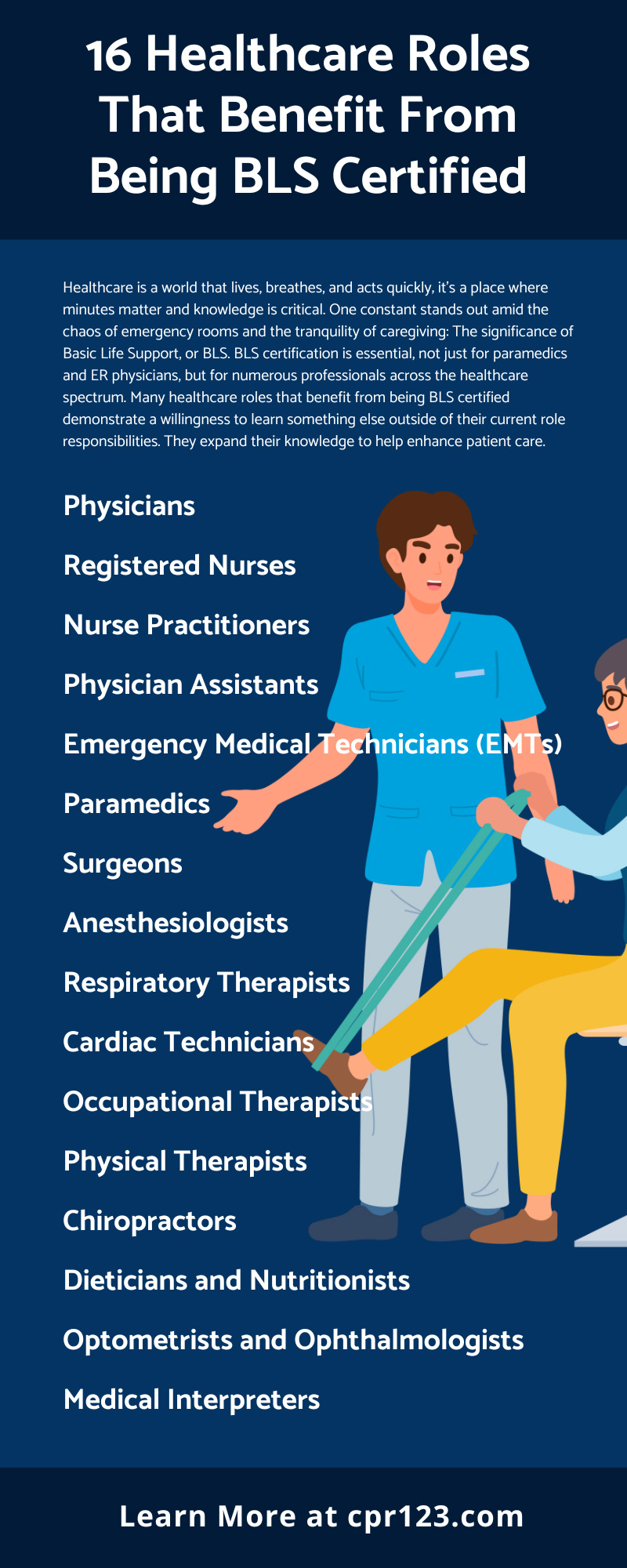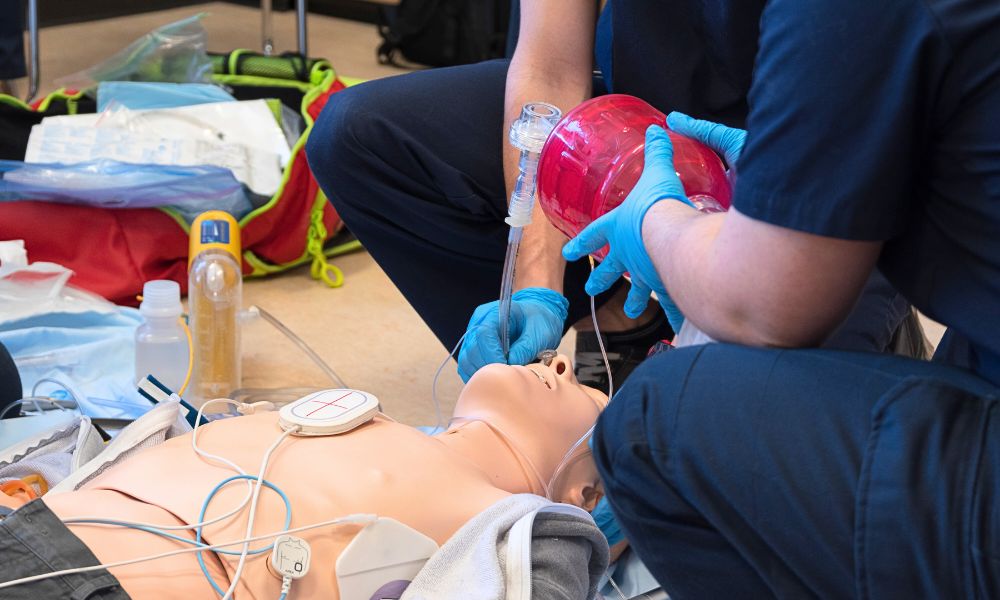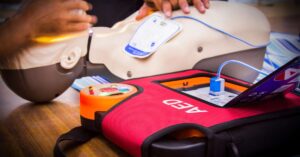Healthcare is a world that lives, breathes, and acts quickly; it’s a place where minutes matter and knowledge is critical. One constant stands out amid the chaos of emergency rooms and the tranquility of caregiving: The significance of Basic Life Support, or BLS. BLS certification is essential, not just for paramedics and ER physicians, but for numerous professionals across the healthcare spectrum. Many healthcare roles that benefit from being BLS certified demonstrate a willingness to learn something else outside of their current role responsibilities. They expand their knowledge to help enhance patient care.
Physicians
Physicians are the first port of call in critical situations. Despite having an expansive skill set, BLS certification helps physicians comply with regulatory requirements, leading to emergency response efforts. Consider the fast-paced environment of an emergency room. Here, where life-altering situations unfold with each passing moment, BLS becomes more than training; it becomes muscle memory for precise execution.
Registered Nurses
The real healthcare role that keeps the front lines standing strong is a registered nurse. RNs often find themselves in scenarios where their BLS training is essential whether working on a surgical floor, in pediatrics, or in gerontology, be it in code blue situations or the provision of daily care, hether working on a surgical floor, in pediatrics, or in gerontology. Acquiring a BLS accreditation is as much a part of patient care as the stethoscope draped around their necks.
Nurse Practitioners
Nurse practitioners (NPs) have become increasingly vital in healthcare, offering various advanced services. However, the ability to provide BLS interventions is non-negotiable. With the autonomy to diagnose, treat, and prescribe, NPs wield considerable power, making them the best in their field in improving a patient’s life while under their care.
Physician Assistants
A physician assistant (PA) often acts as an extension of the physician, especially in settings where medical assistance is necessary. With systemic operation protocols varying widely from one healthcare facility to another, BLS certification ensures that PAs can glide seamlessly into any role, confident in their ability to resuscitate a patient in need.
Emergency Medical Technicians (EMTs)
Perhaps nowhere is the value of BLS certification more evident than the role of an emergency medical technician. The first responders at the site of medical emergencies, EMTs, employ BLS techniques more regularly and critically than most professionals, making this certification pivotal.
Paramedics
Paramedics are other highly trained individuals who value BLS certification tremendously. Once given this distinction, paramedics develop a broader knowledge of their position and different ways to support patients in critical care.
Surgeons
Many see surgeons as cool, collected professionals who excel under pressure in the operating room. Yet, even in their meticulously planned postures, a patient’s heart might falter, requiring immediate intervention. Therefore, surgeons equipped with BLS training are skilled with scalpels and well-versed in saving a life with their hands.
Anesthesiologists
A profession you may not think would need a BLS certificate is an anesthesiologist. These workers, geared with the responsibility of putting patients under, also ensure they wake up post-procedure. While critical crises happen in surgical spaces, an anesthesiologist with a BLS accreditation can come into work with proper protocols to help manage the patient’s experience while under.
Respiratory Therapists
Respiratory therapists (RTs) specialize in preventing, diagnosing, and managing medical conditions that hamper the patient’s breathing ability. Given the nature of their work, BLS is just as important to include in their repertoire as the knowledge of respiratory systems and treatments. For RTs, incorporating BLS interventions into their daily practices is essential for achieving positive patient outcomes.
Cardiac Technicians
Working primarily with patients with heart issues, cardiac technicians are essential in diagnosing and treating cardiac conditions. BLS certification ensures they can respond effectively to emergencies, as cardiac patients often experience sudden distress that requires immediate, life-saving measures.
Occupational Therapists
Occupational therapists (OTs) focus on rehabilitating patients with physical or mental health issues by helping them learn independent living skills so they perform daily activities on their own without too much supervision. Despite a focus away from emergency medicine, BLS certification equips OTs with the skills to help patients wean into their recovery processes, as some can be arduous and stressful on the patient’s body.
Physical Therapists
Akin to OTs, physical therapists (PTs) help patients improve or recover their physical abilities due to injury or illness. With therapy often involving exertion and even unexpected patient reactions, BLS knowledge becomes an essential safety net in case of an emergency.
Chiropractors
Though often seen as providing non-invasive treatments, chiropractors engage in therapies and adjustments to parts of the body that may inadvertently lead to emergencies requiring BLS-level intervention. Being certified in BLS ensures chiropractors can manage these situations effectively.
Dieticians and Nutritionists
While dieticians and nutritionists primarily focus on advising individuals or healthcare organizations on proper nutrition and diet maintenance, their roles often intersect with patients dealing with chronic conditions. A BLS certification ensures they can provide the necessary support until specialized care arrives when faced with a crisis.
Optometrists and Ophthalmologists
Primarily concerned with the health of the eyes and visual system, optometrists and ophthalmologists may encounter patients who also require BLS management. For example, a patient experiencing a medical emergency during an eye examination or procedure will require the optometrist or ophthalmologist to know BLS.
Medical Interpreters
Medical staff and patients must know how to communicate clearly and effectively. However, miscommunication does happen sometimes, especially if there is a language barrier or the patient has a communication disorder. Miscommunication can precipitate crises that may require immediate intervention, so hiring medical interpreters with BLS training enables them to relay information accurately and assist in case the patient’s health is in jeopardy.
The healthcare roles that benefit from being BLS certified, help job seekers and current employees stand out when they list themselves as BLS-certified. BLS proficiency is not just a mandatory part of training, whether at the bedside, in the boardroom, or on the scene —it’s a reflex born from the desire to save lives.
Interested in joining the ranks of the BLS-certified professionals who are ready to make an impact? Enroll in an online BLS course with skills testing provided by CPR123. With this certification in hand, you can take your first step toward ensuring that the heartbeat of our healthcare system remains strong.








